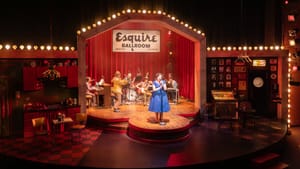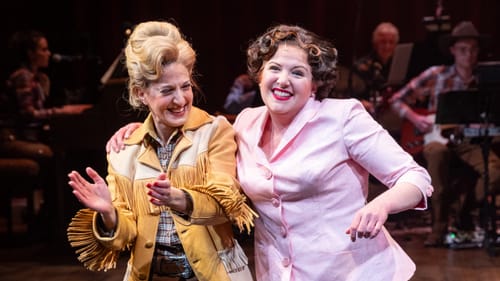Stay in the Loop
BSR publishes on a weekly schedule, with an email newsletter every Wednesday and Thursday morning. There’s no paywall, and subscribing is always free.
Live country all the way
Delaware Theatre Company presents Ted Swindley’s Always… Patsy Cline

The winning production of Always… Patsy Cline at Delaware Theatre Company is chock-full of the songs that made Patsy Cline a country music legend. Beautifully directed by Jennie Eisenhower, this charming two-hander ably tells the story of the singer’s all-too-short life.
The show is a jukebox musical whose subject was in fact heard on a jukebox, and just to make the point, there’s one onstage. But there’s no recorded music here. When Patsy (the remarkable Meagan Lewis-Michelson) takes the stage and starts to sing, it’s live country all the way. Playwright Ted Swindley based his popular play on the true story of an unusual friendship, and Patsy shares the stage with her devoted uber-fan Louise (the effervescent Leah Walton).
As the audience settles in, musicians in jeans amble onstage and warm up, gradually rising over piped-in preshow tunes just like in a club gig. Led by music director Jennifer Peacock from the keyboard of a (perfectly chosen) upright piano, the six-piece band includes acoustic and electric guitars, drums, bass, and those country music necessities, a hot fiddle and a wailing pedal steel.
Channeling Patsy and Louise
An outspoken Southern gal, Louise went crazy for the singer from the minute she saw Patsy on TV. Regularly calling her local radio station, Louise hounds the deejay into playing Patsy's records. She then drags pals to see Patsy's show and, noticing the singer sitting alone, makes the hospitable move that begins their friendship.
The script gives both actors equal dramatic weight, but it’s distributed in an unusual and effective way. Louise tells the story of their friendship in a series of monologues, sometimes in direct address to the audience. But throughout the play, Patsy rarely speaks. She tells her strong narrative arc via the show’s 27 iconic songs skillfully woven throughout the story.
Channeling Cline, versatile vocalist and actor Lewis-Michelson is radiant and literally pitch-perfect. Cline worked as a soda-fountain waitress in her hometown of Winchester, Virginia, before she got her first break, and song after song, Lewis-Michelson illustrates the star’s trajectory with great singing, freshness, and dramatic flair.
As Louise, Walton is a ball of Southern fire: outspoken, direct, telling it like it is. At the preview I saw, she worked a little over-hard in the play’s opening to establish this big and big-hearted character, but the actor soon settled into a compelling storytelling rhythm that charmed the audience.
Inventive, authentic design
All this takes place on Chris Haig’s inventive set, its three playing areas perfectly serving the story. Louise’s kitchen is stage left, and a club setting stage right is complete with Schlitz beer signs and that 1960s jukebox. They flank a center-stage bandstand with a wood-floored performance area that nimbly traverses Cline's career arc. By turns it’s a honky-tonk song palace; the Arthur Godfrey Talent Hour (a black-and-white TV show where Cline was an early-career regular); the Houston ballroom where she and Louise meet; and the pinnacle gig of any country music performer’s trajectory, the Grand Ole Opry.

Kelly McLaughlin’s witty props include some of those big old microphones with the long cords and period foods in Louise’s kitchen. Dramatic transitions of time and place are smoothly and clearly delineated by Alyssandra Docherty’s lighting design, able to morph from smoky bar haze to the cold light of 1950s TV to the old-fashioned vaudeville-style lights of the Opry.
Patsy’s wardrobe, designed by Richard St. Clair, is simply outstanding. While the band and Walton are well-costumed, Lewis-Michelson is dressed in stunningly accurate and beautifully constructed period garments, including a Western-style outfit that was (surprisingly) made in Amsterdam and is authentic enough to grace the Opry stage. And John Kolbinski’s sound design is clear, admirably balanced, and period-appropriate.
Cleverly adding to the ambiance, before the show and at intermission concessions are sold at Patsy’s Parlor, a bar with a 1960s-style menu that’s rolled onstage and hosted at every performance by Delaware Theatre Company artistic director (and bartender) Matt Silva.
A masterful meeting
At age 30, Cline died tragically in a 1963 plane crash, something Louise drops into one of her monologues with a suddenness that echoes the suddenness of Patsy’s death. But in her short lifetime, the singer amassed an impressive list of firsts. Considered one of the most influential vocalists of the 20th century, Cline was the first country artist to cross into the pop charts, and in 1961, she became the first woman in country music to perform at Carnegie Hall. After her death, she was the first female solo artist inducted into the Country Music Hall of Fame (1973), and in 1995, she received a posthumous Grammy Lifetime Achievement award.
This show is packed with Cline’s beloved hits like “I Fall to Pieces,” “Sweet Dreams,” “Walkin’ After Midnight,” and “Crazy,” her signature (written by Willie Nelson). There are also standards like “You Belong to Me” and “Faded Love,” along with some haunting traditional melodies. By the end of the evening—thanks to a great band and those great songs and Lewis-Michelson’s masterful performance—you will likely feel as if you’ve indeed met the great Miss Patsy Cline.
What, When, Where
Always… Patsy Cline. By Ted Swindley, directed by Jennie Eisenhower with music direction by Jennifer Peacock. $32-$70. Through March 10, 2024, at Delaware Theatre Company, 200 Water Street, Wilmington. (302) 594-1100 or delawaretheatre.org.
Accessibility
Delaware Theatre Company is a wheelchair-accessible venue, with wireless assistive listening and large-print programs available. For wheelchair seating, notify the box office. Free parking is adjacent to the theater, which is a short walk from the Wilmington train station serviced by SEPTA and Amtrak. The 2pm performance on Saturday, March 9, will be ASL-interpreted.
Sign up for our newsletter
All of the week's new articles, all in one place. Sign up for the free weekly BSR newsletters, and don't miss a conversation.

 Gail Obenreder
Gail Obenreder